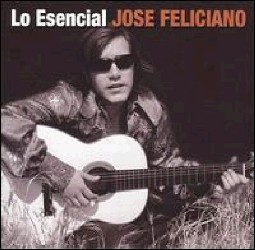Jose Feliciano – Lo Esencial De Jose Feliciano (2011)
Jose Feliciano – Lo Esencial De Jose Feliciano (2011)

CD1 01 – QUE SERA 02 – LA COPA ROTA 03 – EL RELOJ 04 – DOS COSAS 05 – NOCHE DE RONDA 06 – VOLVER 07 – VERDAD AMARGA 08 – PIEL CANELA 09 – SABOR A M+ 10 – LO MISMO QUE A USTED 11 – CORAZON, PORQUE LA QUIERES 12 – LA CARCEL DE SING SING 13 – EL CIEGO 14 – NO LLORES M¦S 15 – CAMINO VERDE 16 – YA SE FUE play 17 – NOSOTROS 18 – QUÉDATE CON TU DINERO 19 – LA BARCA 20 – GUANTANAMERA 21 – EL JINETE CD2 01 – AMOR GITANO 02 – USTED 03 – SIN FE 04 – REGALAME ESTA NOCHE 05 – MARIA ISABEL 06 – MIÉNTEME 07 – CONTIGO EN LA DISTANCIA 08 – LUZ Y SOMBRA 09 – MOLIENDO CAFÉ 10 – FALSA MONEDA 11 – CELOSO play 12 – SABRA DIOS 13 – EXTRAÑOS EN LA NOCHE 14 – DIOS EN TUS OJOS 15 – TODA UNA VIDA 16 – ESCANDALO 17 – CORAZON DE ACERO 18 – ESTOY PERDIDO 19 – PLAZOS TRAICIONEROS 20 – MIS NOCHES SIN TI 21 – UNA AVENTURA MAS CD3 01 – POR ELLA (A DTO CON JOSÉ JOSÉ) 02 – UN AMOR AS+ (A DTO CON LANNI HALL) 03 – VUÉLVEME A QUERER 04 – DESPUÉS DE TI QUÉ 05 – TU RECUERDO Y YO (A DUETO CON JOSÉ ALFREDO JIMÉNEZ) 06 – ABAZAME 07 – SOMBRAS 08 – PECADO MORTAL 09 – PEGAO 10 – SAMBA PA’ TI 11 – QUE VOY A HACER SIN TI 12 – CELOS DE MI GUITARRA 13 – POR SEGUIR TUS HUELLAS play 14 – CALIFORNIA DREAMIN’ 15 – LIGHT MY FIRE 16 – SUSIE-Q 17 – LE LO LAI 18 – FELIZ NAVIDAD
One of the most prominent Latin-born performers of the pop era, singer/guitarist Jose Feliciano was born September 10, 1945, in Lares, Puerto Rico; the victim of congenital glaucoma, he was left permanently blind at birth. Five years later, he and his family moved to New York City's Spanish Harlem area; there Feliciano began learning the accordion, later taking up the guitar and making his first public appearance at the Bronx's El Teatro Puerto Rico at the age of nine. While in high school he became a fixture of the Greenwich Village coffeehouse circuit, eventually quitting school in 1962 in order to accept a permanent gig in Detroit; a contract with RCA followed a performance at New York's Gerde's Folk City, and within two years he appeared at the Newport Jazz Festival. After bowing with the 1964 novelty single "Everybody Do the Click," he issued his flamenco-flavored debut LP The Voice and Guitar of Jose Feliciano, trailed early the next year by The Fantastic Feliciano.
Unhappy with the direction of his music following the release of 1966's A Bag Full of Soul, Feliciano returned to his roots, releasing three consecutive Spanish-language LPs -- Sombras...Una Voz, Una Guitarra, Mas Exitos de Jose Feliciano and El Sentimiento, La Voz y La Guitarra de Jose Feliciano -- on RCA International, scoring on the Latin pop charts with the singles "La Copa Rota" and "Amor Gitana." With 1968's Feliciano!, he scored a breakthrough hit with a soulful reading of the Doors' "Light My Fire" that launched him into the mainstream pop stratosphere; a smash cover of Tommy Tucker's R&B chestnut "Hi Heel Sneakers" solidified his success, and soon Feliciano found himself performing the national anthem during the 1968 World Series. His idiosyncratic Latin-jazz performance of the song proved highly controversial, and despite the outcry of traditionalists and nationalists, his status as an emerging counterculture hero was secured, with a single of his rendition also becoming a hit.
In 1969 Feliciano recorded three LPs -- Souled, Alive Alive-O, and Feliciano 10 to 23 -- and won a Grammy for Best New Artist; however, he never again equalled the success of "Light My Fire," and only the theme song to the sitcom Chico and the Man subsequently achieved hit status, edging into the Top 100 singles chart in 1974. Throughout the 1970s Feliciano remained an active performer, however, touring annually and issuing a number of LPs in both English and Spanish, including 1973's Steve Cropper-produced Compartments; he also appeared on the Joni Mitchell hit "Free Man in Paris," and guested on a number of television series including Kung Fu and McMillan and Wife. In 1980 Feliciano was the first performer signed to the new Latin division of Motown, making his label debut with an eponymous effort the following year; his recorded output tapered off during the course of the decade, although he occasionally resurfaced with LPs including 1987's Tu Immenso Amor and 1989's I'm Never Gonna Change. A school in East Harlem was renamed the Jose Feliciano Performing Arts School in his honor; in 1996, he also appeared briefly in the hit film Fargo. --- Jason Ankeny, allmusic.com
José Feliciano (właściwie José Montserrate Feliciano García, ur. 10 września 1945 w Lares) - niewidomy portorykański kompozytor, autor tekstów i gitarzysta. Wykonawca popularnych piosenek pochodzenia południowoamerykańskiego, również utworów bluesowych i soulowych, najbardziej znane piosenki to Che sarà, Malaguena, Masters of War, Hitchcock Railway, Life Is That Way, Cuando Pienso En Ti, Sin Luz.
Feliciano urodził się w Lares w Portoryko jako jedno z jedenaściorga dzieci. Jest niewidomy, co jest skutkiem wrodzonej jaskry. Od dziecka edukował się muzycznie. W wieku pięciu lat jego rodzina przeniosła się do Nowego Jorku. W wieku lat siedemnastu zakończył szkołę i zajął się grą w klubach, występował też w Detroit. ---wiki
download (mp3 @320 kbs):
yandex 4shared mega mediafire zalivalka cloudmailru oboom uplea
Last Updated (Friday, 16 October 2015 09:06)








